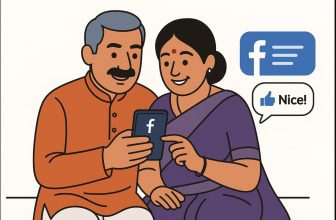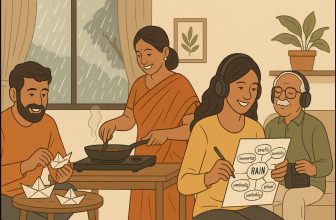In Indian families, people don’t just inherit property or surnames, they often carry forward faces, habits, health conditions, and even emotional patterns. Whether it’s your father’s sharp jawline or your mother’s quiet determination, relatives rarely hesitate to point out where you “got it from.” These inherited traits aren’t just biological, they’re also deeply woven into how Indian households view identity, pride, and belonging.
This listicle explores 16 such traits that are commonly passed down from either parent, reflecting not only genetics but also the layered traditions and beliefs unique to Indian families.
Physical Traits You Often Trace Back to One Parent
1. Facial Structure and Complexion
Jawline, cheekbones, and especially skin tone are commonly discussed in Indian families. If you’re fair like your father or have your mother’s nose, it becomes a permanent identity marker, often with social bias, especially regarding complexion.
2. Hairline and Hair Texture
Hair thinning in Indian men is often blamed on the father’s side, while curly or straight texture is said to follow the mother’s genes. These perceptions run deep, even when actual genetic science is more complex.
3. Eyes and Their Shape
Though brown eyes dominate in India, the shape, round, almond, or deep-set, often reflects one parent. Light brown or hazel tones (less common in India) can also trace back to a specific side of the family.
Health Risks Passed Through Generations
4. Diabetes and High Blood Pressure
If your father or his siblings have diabetes, Indian elders will caution you to avoid sugar. These chronic health risks are often watched more closely if they run in the paternal line, even though maternal inheritance can be equally strong.
5. Mental Health and Emotional Balance
Traits like anxiety or extreme emotional sensitivity are often dismissed or misunderstood. But many people mirror the emotional resilience or instability they’ve seen in one parent, whether acknowledged or not.
6. Body Shape and Metabolism
If you’re slim like your mother or tall like your father, your relatives will notice. Statements like “maa ka shareer hai” are common in households, especially when kids grow differently than siblings.
Personality Patterns That Don’t Come from Nowhere
7. Temperament: Calm vs. Short-Tempered
Many Indian families assume anger comes from the father and patience from the mother. Whether true or not, these patterns often repeat across generations, and affect how children handle pressure.
8. Discipline and Routine Habits
If your father is meticulous or lazy, you may unconsciously follow the same pattern. Mothers often pass on household rhythms, like waking early, finishing work on time, or managing multiple tasks silently.
9. Humor and Verbal Style
Sarcasm, storytelling, and even the way you raise your voice often follow one parent more. This is especially visible in siblings who “speak like papa” or “laugh like mummy.”
Cultural and Spiritual Leanings That Rarely Come from Outsiders
10. Religious Practices and Devotion
If your mother fasts every Monday or your father performs pooja every morning, chances are you’ve picked up the same habits. Faith, or the lack of it, is usually a direct family inheritance.
11. Language and Traditional Knowledge
Children often speak the dialect of the parent who insists more. For instance, if your mother insists on Tamil or Bhojpuri at home, you’re more likely to retain it, even if your father speaks English or Hindi.
12. Food Preferences and Spice Tolerance
Your spice levels, sweet tooth, or dislike for certain foods are usually shaped by the home kitchen. If your mother cooks bland food or your father loves mirchi, it influences your lifelong taste.
Educational and Skill-Based Abilities Passed Along Lines
13. Academic Aptitude: Math or Language
Some children inherit a knack for numbers like their father, others a love for poetry from their mother. Indian families often trace academic strengths to one specific ancestor or side of the family.
14. Music, Drawing, or Technology
If your mother’s side includes singers or painters, or your father is known for tech skills, you might notice those talents surfacing without formal training.
Deeper Relationship Traits You Didn’t Know You Inherited
15. Parenting Style and Emotional Support
The way you raise children often mirrors your experience growing up. If your father was distant or your mother overly protective, you may unconsciously repeat or rebel against those tendencies.
16. Handling Conflict and Relationships
Whether you argue loudly like your father or withdraw like your mother, your style of dealing with relationships usually echoes what you saw at home. In India, this often plays out in marriage dynamics and family discussions.
Summary: Subtle Traits That Often Come from Your Father or Mother
In Indian households, traits passed from parents to children are more than just DNA markers, they’re seen as reflections of family history, personality, and even destiny. Whether it’s your father’s strict discipline or your mother’s emotional strength, these patterns often shape how others see you and how you see yourself.
But not every inherited trait is fixed. While some patterns are genetic, others are learned through observation and daily interaction. Recognizing where these traits come from can help you preserve the strengths passed down through generations and consciously change the ones that don’t serve you.
In the end, knowing who you take after isn’t just about resemblance. It’s about understanding your roots and choosing how to grow from them.





